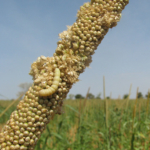


International Crops Research Institute for the Semi-Arid Tropics
Mooriben Union Made Bane at Falwel, MOORIBEN Union Hareyben at Tera, FUMA Gaskiya & INRAN
Mali
11/2014—11/2018
In Niger, new varieties of pearl millet and legumes have been identified that give farmers advantages in terms of yield, crop yield stability, resistance to major pests and diseases, and grain micro-nutrient density. However, seed quantities produced are still low when compared to the quantities required to sow at least 25% of the country’s cropped areas with improved variety seeds. More widespread adoption by pearl millet and legume producers requires a focused effort on outreach accompanied by dynamic breeding programs to achieve the measurable gains in food security that are urgently required.Building on the success of and lessons learned from the two previous phases of the CCRP-funded Seed Systems project in West Africa, this project increases the utilization of improved seeds and other technologies to enhance the resilience of rural communities in Niger, and thereby complements the current CCRP projects on seed systems, sorghum, and millet.
Building on the success of and lessons learned from the two previous phases of the CCRP-funded Seed Systems project in West Africa, the purpose of this request is to increase the utilization of improved seeds and other technologies to enhance the resilience of rural communities in Niger. This will complement the CCRP-funded Seed Systems III project in Mali and Burkina Faso, as well as the breeding work that is also on-going under the WAf CoP. Specific objectives are: (1) To identify institutional and social measures that contribute, limit, and/or sustain farmer managed seed enterprises; (2) To identify tools, marketing and communication approaches for use by farmer-managed seed enterprises that enhance uptake of new varieties of traditional cereal and legume crops by small-scale farmers in Niger; and (3) To identify and understand gender-relevant consequences/ opportunities for the dissemination of specific new cultivars of pearl millet and legumes, and the necessary accompanying technologies in the target regions of the seed cooperatives in Niger.
Expected outcomes of this project will be:
The outputs that should lead to the desired outcomes include:
